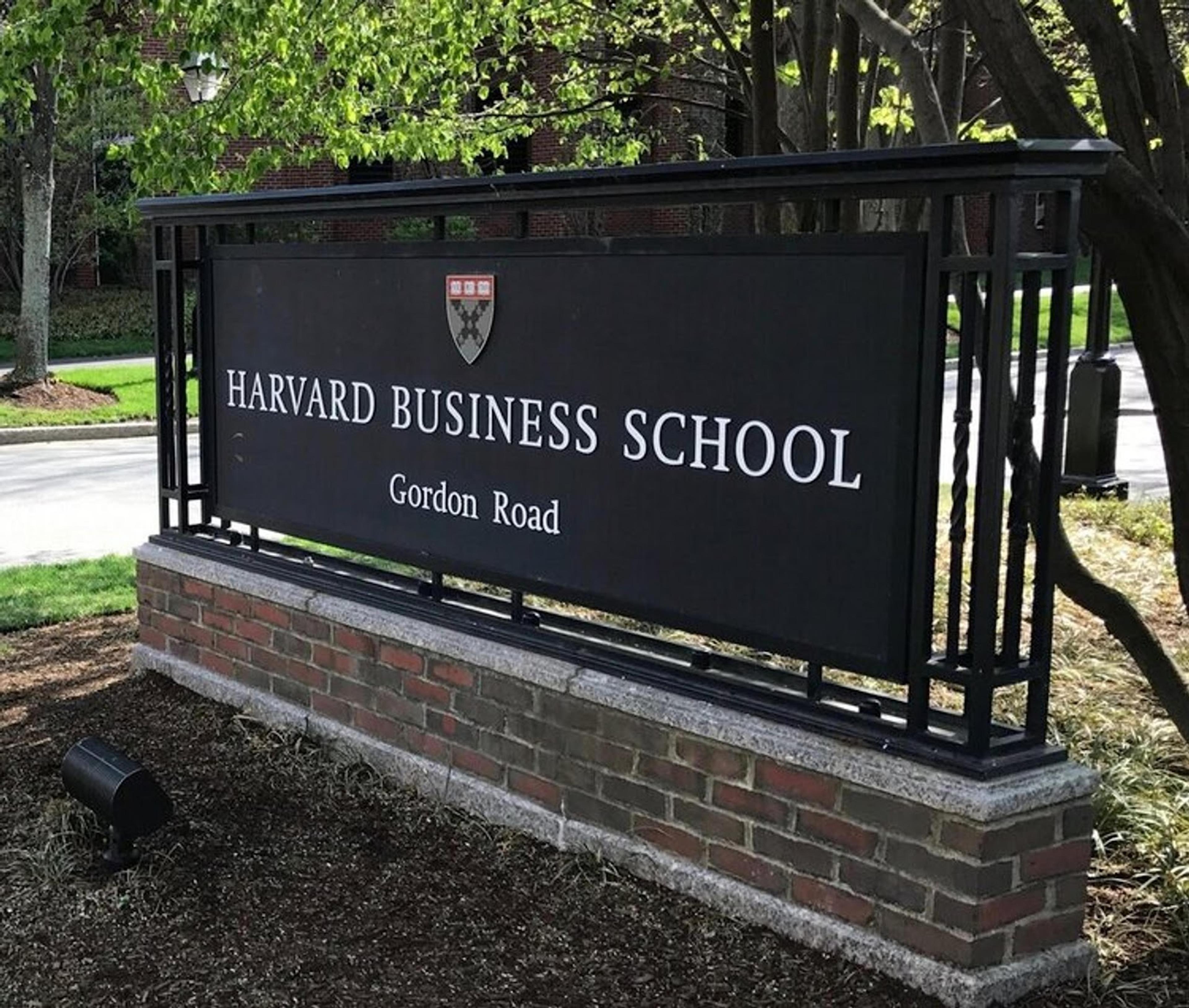How to Write the HBS Essays: Prompts, Tips, and Examples from Admits (2025)
Learn how to approach the new HBS essays with clear strategies, essay breakdowns, and real tips from successful Harvard MBA applicants.
By Timothy F.
Former Ad Comm | 150+ M7 Admits | Ranked top 4 firm on Poets & Quants 2025
Posted July 22, 2025

Table of Contents
Harvard Business School recently changed its MBA essay, deviating from its iconic, open-ended “What else should we know about you?” prompt that it had used for the previous ten years. Instead of that single essay, applicants must now respond to three separate, shorter essay prompts.
These new HBS essays have been introduced under the leadership of the new Managing Director of Admissions and Financial Aid, reflecting a broader approach to admissions criteria and clearer expectations for candidates. These changes are meant to better reflect what the HBS admissions board values in candidates today, particularly in light of the school’s revised evaluation criteria.
If you’re applying for the Class of 2028, you’ll need to submit responses that address being business-minded, leadership-focused, and growth-oriented, and demonstrate your community involvement. Each essay has a tight word limit and a specific question. Let’s walk through the new prompts, what the admissions officers are looking for, how to structure each response, and how to avoid common mistakes.
As a professional MBA admissions coach who's helped hundreds of applicants get into their target business schools, including HBS and the rest of the M7, I know what a great MBA essay looks like and what it takes to get there. After having the same open-ended essay for years, HBS only recently updated its prompts to be narrower and shorter. Here's everything you need to know about what they are and how to get started. For personalized support on brainstorming, drafting, and polishing your HBS essays, reach out to me. I'm here to help you put together the strongest possible application. With that, let's dive in.
Harvard MBA Essay Prompts (2025-2026)
Applicants to the MBA Class of 2028 (matriculating fall 2026) need to respond to three essay prompts. The shift to shorter essays allows applicants to focus on specific aspects of their candidacy with the added pressure of a very tight word count. Each essay is aligned with one of the new HBS evaluation pillars: business-minded, leadership-focused, and growth-oriented. You’ll also submit a short answer about your career goals.
Business-Minded Essay
"Please reflect on how your choices have influenced your career path and aspirations. (300 words)"
Leadership-Focused Essay
"What experiences have shaped how you invest in others and how you lead? (250 words)"
Growth-Oriented Essay
"Curiosity can be seen in many ways. Please share an example of how you have demonstrated curiosity and how that has influenced your growth. (250 words)"
What to Know About the HBS Essays
Each essay has a tight word limit and a clear objective, especially focusing on creative problem solving. The file reader, who evaluates your essays and applications, values clarity, introspection, and conciseness, preferring to quickly identify relevant information. There’s no space for fluff, repetition, or finesse. Instead, the admissions committee is evaluating your ability to explain what impact you aspire to have, who you are and want to become as a leader, and how you fiercely pursue growth.
You’re not expected to summarize your resume. These essays are the only part of the written application where you can express your personal values, decision-making, and self-awareness in your own words.
Why the HBS Essays Matter More Than Ever

Your test scores, resume, and recommendation letters show what you’ve done. These essay prompts are written to offer you the opportunity to show who you are. The HBS admissions team uses your essays to evaluate your self-awareness, values, and readiness to learn in the HBS classroom, where active listening, confidence, lively discussion, and integrated thinking are central to the learning.
The essays are also a way to see if you align with the school’s mission to educate leaders who make a difference in the world. Additionally, they assess whether you will contribute to and benefit from a community that thrives on business-minded, leadership-focused, and growth-oriented leadership. This community is essential for fostering an enriched learning environment at HBS.
What the HBS Admissions Board Is Really Looking For
The updated prompts map directly to what the admissions committee, including the associate director, believes defines a strong HBS applicant. Relevant updates in your application can significantly enhance your candidacy by showcasing recent professional achievements, additional learning experiences, and increased engagement in extracurricular or volunteer activities. The three core traits are:
| Trait | What They Want to See |
|---|---|
| Business-Minded | Clear career vision with impact beyond self-interest. |
| Leadership-Focused | Awareness around your leadership strengths, how you invest in others, lead with purpose, and take initiative. |
| Growth-Oriented | Examples of demonstrated curiosity, learning, and personal or professional growth that is a derivative of this curiosity. |
Note: Each essay is a chance to show these traits through your past experiences and individualized learnings, not general statements.
Breakdown & Analysis of Each Essay
Business-Minded Essay
What They’re Looking For: The HBS ad comm views business as a mechanism to enact change, and they’re very interested in understanding what impact you hope to have through the lens of your business ambitions. This prompt asks you to show how your career choices and aspirations reflect a thoughtful understanding of your role in business. It’s not just about your job—it’s about your vision for how you’ll improve the organizations and communities you serve.
How to Approach It:
- Start with one or two past experiences that have shaped your career direction
- Show how those moments have influenced your goals
- Highlight the importance of professional work in demonstrating your leadership impact and how it has prepared you to tackle industry-specific challenges
- Explain how you’ll use your career to create a broader impact
Expert Tip: Your response, especially the impact, should be practical and direct. Use this essay to explain what motivates your professional passions, how you want to make a difference, and why it matters to you personally.
Leadership-Focused Essay
What They’re Looking For: The leadership-focused essay evaluates how you’ve grown as a leader and how you’ve helped others grow along the way. The committee wants to understand what has shaped your leadership style and how you use that style to support and empower others. Finally, they want to see self-awareness around your leadership growth trajectory. What do you lack as a leader, and what type of leader do you aspire to become?
How to Approach It:
- Start by identifying your personal leadership brand - this should be specific and reflect how you’ve developed others throughout your academic and professional careers
- Choose one formative leadership story or a clear theme from several moments
- Describe how you supported, coached, or empowered others, connected to your leadership brand
- Explain what kind of leader you aspire to become—and why, showcasing your journey as a future leader
Expert Tip: Strong responses show a track record of helping others, managing challenges, and learning through action. The best ones focus on influence, not authority, and are hyper-specific about how you lead. We all know that good leaders care about those they lead - you need to give them something authentic and insightful about how you influence those around you, especially amidst complex incentive structures.
Growth-Oriented Essay
What They’re Looking For: This prompt focuses on demonstrated curiosity, not just an interest in something, but an interest that inspires an effort to learn and apply new ideas. HBS is looking for people who take initiative to explore unfamiliar topics, ask questions, and change their perspective.
How to Approach It:
- Start with a clear moment of curiosity about an idea or distinct topic
- Explain what actions you took to explore further
- Show what you learned—and how it changed you - the key is to get to growth. How are you different because of your demonstrated curiosity in this topic?
Expert Tip: Stick to a simple structure: situation → action → growth. Your story doesn’t need to be impressive. It needs to be honest and specific and clearly connected to your growth journey.
Common Mistakes Applicants Make — and How to Avoid Them
1. Treating the Essays Like Separate Assignments
One of the biggest mistakes candidates make is writing each essay in isolation, without thinking about how they fit together. HBS designed these prompts to collectively reveal your leadership style, intellectual wiring, and personal growth trajectory. If your essays don't feel coherent when read together – you lose the opportunity to show strategic self-awareness, complementary, reinforcing experiences, and narrative consistency.
2. Staying at the Surface Level
Because the word counts are tight (250–300 words), many applicants default to listing facts: jobs, titles, awards, responsibilities. But HBS doesn’t need you to restate your resume, they want to understand how you think, why you care, and how you grow. Especially in the Growth and Leadership essays, reflection and getting to authenticity quickly are critical.
3. Ignoring the Specific Language of the Prompts
Each of these prompts contains subtle nuances that must be given appropriate attention. For example, the Business-Minded essay explicitly asks about impact on businesses, organizations, and communities, not just personal career advancement. The Growth-Oriented essay demands a clear link between curiosity and growth. Applicants who don’t slow down and tailor their answers to the true spirit of the prompt come across as tone-deaf.
4. Writing in a Corporate Tone
Because the Business-Minded essay sounds professional, many applicants fall into a dry, jargon-heavy style across all three essays. HBS is looking for serious thinkers, yes, but real humans. Admissions officers want to feel like they're having a coffee chat with you, not reading a board memo.
5. Playing It Safe
Especially under pressure, candidates often retreat into "safe" essays: listing socially acceptable goals, painting a one-dimensional leadership style, or choosing growth stories that don’t show real vulnerability. But HBS values depth, honesty, and complexity. Essays that don't show any risk-taking, curiosity, or personal stakes will get lost in the noise of the applicant pool.
My Expert Tips
Fiercely Prioritize
With the limited word count and high stakes of these narratives, it is common for applicants to want to pack as much as possible into these essays. Remember, quantity of content does not equal quality. Don’t spend so much time on “the what” that you have no room left to reflect on “the why” or the narrative will feel one-dimensional and miss the mark.
Focus on Your Authentic Story
Don’t write what you think the admissions committee wants to hear. They have read thousands of essays, but they have never read an essay by you, so capitalize on your individuality. HBS wants to know where you have come from and what experiences have shaped who you are. This essay should absolutely not be a retelling of your resume and professional achievements.
Through this essay, HBS wants to see that you understand yourself. They also want to know whether you align with Harvard’s missions and values. They are looking for future leaders who want to make a difference in the world. The best way to prepare for this essay is to deeply reflect on yourself. Who are you? What matters to you? Why are you the way you are? At the end of the day, if you can answer this question, posed by an HBS alum, then you have got a good start: “Could this essay also describe someone else?” If so, then you probably need to do some more introspection.
Start Broad and Narrow
I encourage my clients to always start with a draft that exceeds the work count limit. Focus first on getting the right ideas on the page - what are the authentic experiences that truly highlight who you are (your values, your motivations, your strengths and weaknesses, etc.) and what reflection can you offer to help them understand your journey better? Once you’ve successfully answered those with content that will resonate, meticulously scrutinize over every word. Ask yourself, “Does the admissions committee need to know this?” If not, it’s probably safe to take out.
Aligning your MBA applications with the program's values is crucial. This alignment demonstrates that you understand and are committed to the principles that the program upholds, making your application stand out.
Imagine that your essay is the hundredth that the adcom member is reading that day. How would you write to keep them engaged while also preserving the integrity of your story? That is the balance that you are looking for.
Don’t Make “Why HBS?” Your Focus
Unlike many other business schools, Harvard does not ask the stereotypical “Why HBS?” question. With that being said, applicants often feel like they need to use the essay to demonstrate their commitment to HBS. This is not the right approach. Your essay should be about you. Harvard is one of the most prestigious universities in the world, and you don’t need to justify why you want to attend. Using the precious space you have to talk about HBS is a missed opportunity to shed light on your unique contributions to the community (both on campus and throughout your life as an alum) that they’re striving to build.
The same adage from earlier applies here: If your “Why HBS?” answer could explain someone else, then you probably don’t need it.
Build, Build, Build
Like any good story, your HBS essay should have a thread of continuity. Introduce a theme, reconnect to it when explaining why, and tie everything together in the conclusion. In addition to making your essay more interesting, this will prevent it from coming off as disjointed. Building up to the main point will also keep the reader in suspense and eager to read on. Because the prompts are so direct, it may be easier for you to plan out what you want to talk about while sticking within the limits. Regardless, always remember that sticking to a theme will help you ensure that everything you include is relevant.
While having a cohesive narrative is beneficial, it is crucial not to force a central theme unless explicitly requested. Focus on providing authentic and specific examples that reflect your experiences and values.
Get Feedback
After spending hours writing something, it is difficult to step back and view your work with unbiased eyes. Once you’ve written a rough draft of your HBS essays, have a peer or mentor read them and provide feedback. Ideally, the person reviewing your essay will be an alumnus of the school. But if that’s not an option, choose someone with business experience and writing skills who knows something about your background.
Don’t over edit your essay. Drafts, reviews, and edits are all part of the essay writing process, but you don’t want to overpolish, especially to the point that you rub out your individuality. Instead, we recommend starting your essay early so that you have plenty of time to self-reflect, write, and step back for perspective. Once you’ve completed your first draft, ask for feedback and make some edits, but then put it away for a while. When you come back to it, you will have a fresher perspective and be less bogged down by the details.
By following these five tips, you’ll be well on your way to crafting a successful HBS essay! Remember, the key is to be authentic, concise, and reflective. Keep all these in mind, and your essay will be destined for greatness!
How to Get Feedback That Actually Helps (and Doesn’t Dilute Your Voice)
The best feedback comes from people who know how the application process works ideally, ad comm experienced experts, MBA coaches, or even alumni. They’ll help you refine your ideas and make your writing clearer.
MBA admissions officers play a crucial role in evaluating applications, looking for candidates who demonstrate leadership, ambition, professional impact, and a clear vision for their future careers. They have the reps and inside knowledge to help you write something unique, beautiful, and resonant.
The Bottom Line
Writing the HBS essays is not about presenting a perfect version of yourself, it’s about being clear, specific, and honest about who you are, how you’ve grown, and where you’re headed. Each prompt is an opportunity to highlight a distinct part of your journey, whether it’s your career goals, leadership experience, or personal growth through curiosity. The strongest essays show how you think, what drives your decisions, and how you’ll contribute to the HBS community. If you focus on telling your story with intention and depth, you’ll not only write a strong application, but you’ll also gain valuable insight into your own goals and values.
Additionally, the post-interview reflection is a crucial component of the Harvard MBA application process. Applicants are required to submit this reflection within 24 hours of their interview, encouraging them to document their thoughts immediately and approach it as a critical closing argument that ties together their application narrative.
Get Into HBS With the Help of an Expert
As a former M7 admissions fellow and now as a professional MBA admissions consultant, I have read through hundreds of applications from both sides of the table. I know what it takes to get admitted to an MBA program like Harvard Business School, and I'm here to help you tell your story in as compelling of a way as possible to increase your chances of acceptance. For support on any part of the app, from your MBA resume to letters of rec, essays, application strategy, waitlists, and more, I'm here to be in your corner. Book a free intro call with me, and let’s get started!
The application process can be daunting and difficult, especially without help. Read these articles to get started on your HBS journey.
- Harvard Business School: MBA Program & Application Overview
- How to Write a Powerful MBA Essay
- A Comprehensive MBA Timeline–With Chart
- How to Ace the HBS MBA Interview
- The HBS Waitlist Strategy
- Harvard Business School MBA Application Deadlines (2023-2024)
- How I Got Into Harvard Business School With Low Test Scores
FAQs About the HBS Essays
What are the new HBS essay prompts?
- The new HBS essay prompts consist of three short questions focused on being business-minded, leadership-focused, and growth-oriented. Each prompt is designed to help the admissions committee better understand how you think, lead, and grow. These new prompts reflect the evolving admissions criteria for the MBA Class of 2027, emphasizing a broader range of qualities in applicants.
How long should my HBS essays be?
- The business-minded essay has a word limit of 300, while the leadership-focused and growth-oriented essays are each capped at 250 words. In addition, there’s a career goals short answer limited to 500 characters, which is about 85 to 90 words. The changes in essay prompts were made because many applicants were not effectively answering the previous prompts.
What does HBS want in a business-minded essay?
- In the business-minded essay, HBS wants to see how your experiences have influenced your career direction and the type of impact you hope to make on businesses, organizations, and communities. This is your opportunity to explain your goals and show a broader sense of purpose in your professional path.
Can I reuse content from other schools?
- You should only reuse content from other schools if it directly answers one of the new HBS essay prompts and doesn’t come across as generic or repurposed. Tailored responses that clearly reflect your thinking and goals are far more effective.
What does HBS mean by growth-oriented?
- When HBS asks about being growth-oriented, they want to see how your curiosity led you to take action, learn something new, and grow as a result. The best answers show a mindset of ongoing learning and openness to change.
Written by Timothy
5.0
(98)
I have helped many applicants successfully gain admission to top MBA programs both in the US and in Europe. I worked as an admissions fellow at Chicago Booth. In this role, I interviewed and reviewed the application details of almost 100 applicants across multiple quarters. I understand how to craft a dynamic story that will jump off the page for Ad Comms. Before pursuing an MBA, I started my career at Goldman Sachs, supporting prime brokerage clients with cash and security instruction and settlement. I am currently a project leader at Boston Consulting Group, advising clients mostly in the Gen AI, enterprise transformation, and org design practice areas. At BCG, I have supported clients with pricing strategy, org design, labor optimization, technology integration, and market analysis projects. I am a client service expert and can share valuable insight into how to successfully recruit and be successful at a top-tier investment bank or consulting firm. I earned a B.S. in Economics and in Finance from Utah State University and an MBA with high distinction from The University of Chicago Booth School of Business, where I graduated as an Amy and Richard F. Wallman Scholar.
Timothy has helped clients get into organizations like:
Chicago Booth
Kellogg School of Management (Northwestern)
Columbia Business School
The Wharton School (UPenn)
Yale School of Management












